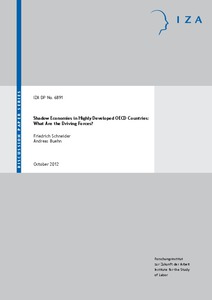Shadow economies in highly developed OECD countries: what are the driving forces?

Schneider, Friedrich ; Buehn, Andreas
Institute of Labor Economics, Bonn
IZA - Bonn
2012
32 p.
hidden economy ; informal economy ; self employment ; tax ; unemployment
Discussion Paper
6891
Economic development
English
Bibliogr.
"In this paper the main focus lies on 'driving forces' of the development and size of the shadow economy in highly developed 39 OECD countries. The influential factors on the shadow economy are tax policies and state regulation, which, if they rise, increase the shadow economy, but also other factors like economic ones (unemployment) are considered, too. Specifically it is shown that the main driving forces are unemployment, self-employment and the tax burden, which have different weights in these 39 countries. Between 1999 and 2010 indirect taxes have by far the largest relative impact (29.4%), followed by self-employment (22.2%), unemployment (16.9%), personal income taxes (13.1%) and tax morale (9.5%)."
Digital
The ETUI is co-funded by the European Union. Views and opinions expressed are however those of the author(s) only and do not necessarily reflect those of the European Union or the ETUI.